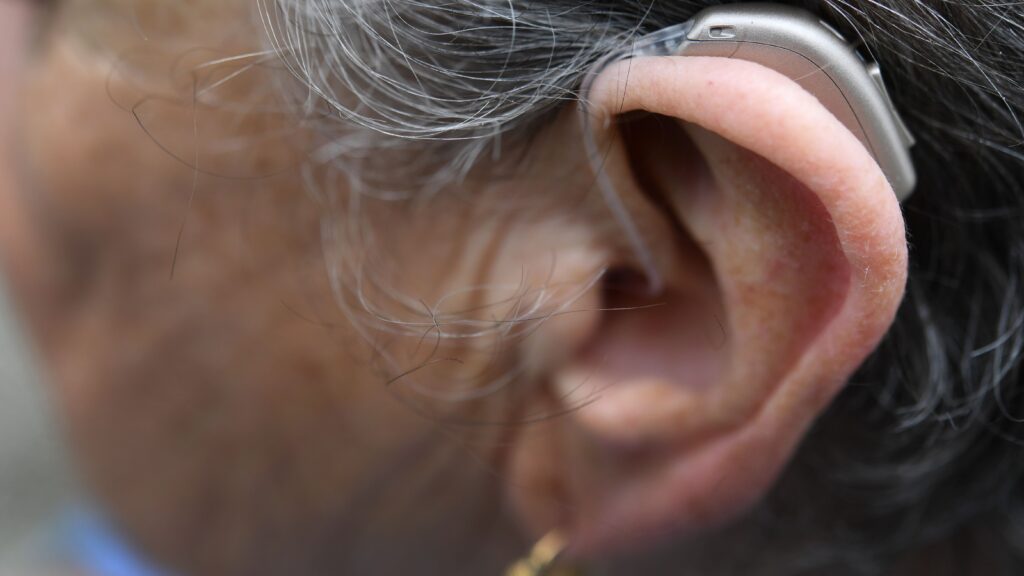Doctors have long suspected that hearing loss in older adults hastens dementia, the cognitive decline associated with aging. A new study published in The Lancet on Tuesday probes the link between the two conditions further in what could be the first randomized controlled trial of its kind.
More than 55 million people have dementia worldwide; a number that continues to grow as more people live longer. Hearing loss has emerged as one of the likely risk factors for dementia for several reasons. As the brain struggles to hear, scientists suspect, it might have less capacity for cognitive work like thinking or remembering. The brain shrinks faster when it absorbs less sound. Hearing loss can also lead to social isolation, leaving older folks less cognitively engaged.
advertisement
Despite various studies exploring and hypothesizing this relationship, there has been no randomized, controlled trial measuring the impact of hearing issues on cognitive decline, or whether hearing aids actually reduce any potential risk.
“I’d hear, ‘oh, someone’s getting older, they should get their hearing treated,’ but it was just lip service,” said Frank Lin, a professor at Johns Hopkins Bloomberg School of Public Health and a principal investigator of the study. “I realized there wasn’t much progress being made because some of those basic questions weren’t answered.”
The ACHIEVE study, launched in November 2017 with funding from the National Institutes of Health, aimed to start answering those questions. The trial followed nearly 1,000 adults between the ages of 70 and 84. A quarter were pulled from an observational heart health study; on average, those participants had more risk factors for dementia. They were older, lower-income, had higher blood pressure, and were more likely to be living alone. The remaining three quarters were volunteers who didn’t partake in the heart health study. Those participants were considered healthier on average than the heart study participants who comprised the control group.
advertisement
Across both groups, half of participants were randomly assigned hearing aids and regular hearing care, while the other half received basic health education every six months. The researchers evaluated each participant’s cognition change after three years.
The study didn’t find any significant difference in the rate or prevalence of cognitive decline between patients who used hearing aids and those who didn’t after three years, as measured by a series of cognitive tests. Those tests, which included delayed word recall and logical memory, were performed annually. Hearing aids were also not tied to a lower risk of cognitive change in the healthier control cohort.
But in the group considered at higher risk of dementia, participants who wore a hearing aid had 48% less cognitive change after three years than those who didn’t.
Rebecca Lewis, chief of audiology at University of California, San Francisco, said the findings will help emphasize the importance of hearing aids to patients at risk of or already experiencing dementia. On the flip side, it will help those at lower risk breathe easier if they have not yet treated their hearing loss.
“People who don’t necessarily have cognitive decline or those risk factors can say, ‘Oh, OK, if I waited two more years, this isn’t going to do me a disservice,” Lewis, who was not involved with the study, said. “But those people who really do have cognitive deficiencies need to make sure this is top of mind.”
To Lin, the lack of impact in the healthier control cohort made sense, because “they didn’t have much cognitive change to begin with” that would make it possible to see a significant change over three years.
Lewis echoed Lin in that one of the study’s limitations is its timeline — it’s possible hearing aids may show benefit in healthier populations over a longer period of time. She also noted that the group treated for hearing loss did not solely receive hearing aids. They were privy to high-quality audiology care, including regular visits and device tune-ups.
“This is really top-level audiology that they’ve provided, it’s not just a ‘let’s plug in some hearing aids and send you on your way,’” Lewis, who recently worked at hearing aid startup Whisper, said. “Would this same approach hold if that group of people had over-the-counter hearing aids without that interaction with an audiologist? I’m not convinced that would be the case.”
Another caveat to the study is its failure to blind the groups against which treatment they had, meaning the placebo effect was not accounted for. Lin said they talked about the possibility of sham hearing aids, but felt that would have discouraged people from joining the study.
The Food and Drug Administration started allowing over-the-counter hearing aids this past fall, opening up the floodgates for device makers and tech giants alike to sell sleeker, smaller products. But most insurers do not cover the devices, making them inaccessible for many patients. Lin hopes the study results will help revive interest in paying for prescription hearing aids at the Centers for Medicare and Medicaid Services, which has been discussed in recent years.
“A big push for us in the next several months is getting together with our congressional policymakers who were really supportive of the Medicare benefit a few years ago, and seeing if we can resurrect that,” Lin said.

